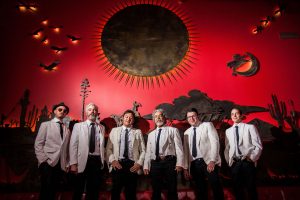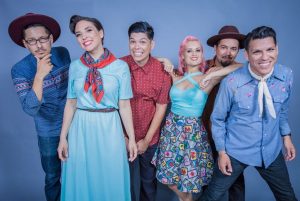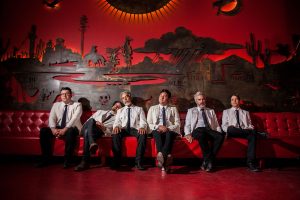“Global music” doesn’t always mean music from around the world. Sometimes, it refers to music created right in the United States, but with roots in other cultures.
One example is Latin music, as written and performed by the Mexican-American communities of Arizona and California, who are merging styles that reflect the shared cultural identities between Mexico and the United States.
BlackRock Center for the Arts in Germantown will present such an amalgam in “The New Golden Age of Latin Music,” a program sponsored by globalFEST On the Road, on the evening of Saturday, Feb. 10. This is the touring component of globalFEST’s annual flagship festival.

The mandate of globalFEST, a not-for-profit organization that three East Coast music promoters created in 2003, is to produce an inclusive, world class, multifaceted arts and culture festival that celebrates and showcases cultural diversity and artistic excellence within communities and across the globe. Performances raise the visibility of its artists and give more general music fans the opportunity to discover the excitement of global sounds, explained Cindy Byram, public relations representative for the globalFEST On the Road tour.
In this context, “global” is defined not only by geography — musicians from outside the United States presenting their music to American audiences — but also by the global influences of artists based here,” she added. “Musicians now are exposed to and inspired by music from around the world, and it’s reflected in their own work.”
The band Las Cafeteras formed in 2008 to document the histories of their California neighborhoods through music. Six years later, the musicians left their other jobs to pursue music exclusively. The band’s name derived from Eastside Café, a community space in the East Los Angeles barrio neighborhood where Las Cafeteras members came to study traditional Mexican music and culture. It essentially refers to the fact that the band members were “the folks from the cafe.”

The name also contains a touch of a political statement. In Spanish, as in many languages, when you have a mixed group of males and females, the group name defers to the male plural. As a mixed-gender group, then, the band should have called itself Los Cafeteros, because the name Las Cafeteras would refer only to an all-female group. By keeping the feminine plural form, Byram explained, the group is rejecting the male-centric structure of the language.
Las Cafeteras vocalist, instrumentalist and dancer Hector Flores said that son jarocho, a musical form from Southern Veracruz in Mexico that combines string instruments (jarana), traditional dance (zapateado) and poetry, is a major component of the band’s repertoire. “Son jarocho is a beautiful mix of Indigenous, Spanish, African and Arabic influences that has survived 400 years of colonization,” he said.
Remixing traditional son jarocho sounds, the group adds Afro-Caribbean marimbol and cajón, poetry in English and Spanglish, and instruments like requinto (a small guitar) and quijada (a donkey jawbone).
Founded by Sergio Mendoza in 2009, Orkestra Mendoza pays homage to the Latin Big Band sound, mixing influences from Mexico and across Latin America with strings, electronic music and contemporary pop. The band’s repertoire ranges from energetic dance tunes to contemplative ballads, all with a distinctive Latin sound.
The Los Angeles Times has called Las Cafeteras’ sound “a uniquely Angelino mishmash of punk, hip-hop, beat music, cumbia and rock,” which Flores explained as follows: “We never believed in musical borders. We were born and raised in Los Angeles and grew up with all kinds of musical influences–from Tupac to Riot Grrl to Rage Against the Machine to Sonora Dinamita. We all fell in love with son jarocho music, but when we began to create our music, we made it a goal to incorporate our musical influences as performers, singers and poets. Our live performances will take you on a musical journey from the Caribbean to California, from son jarocho to hip-hop, from politics to party.”

The band’s socially conscious messages tell stories of a community “looking for love and fighting for justice in the concrete jungle of East L.A,” Flores said.
Orkestra Mendoza’s music, arranged to suggest a Big Band sound with a touch of lo-fi electronics, speaks of a borderless world in which U.S. culture and Latin traditions come together. “I think it has to do with being near the border,” said Mendoza, who grew up in Nogales, Sonora. “Living in Mexico exposed me to many regional styles of Mexico, such as mariachi. Then, when I was 7, we moved to Arizona.”
After “forgetting” about Latin music for many years, and studying jazz, salsa, ska and “a lot” of classic rock and roll, Mendoza said he “took a little bit from all the styles I had played — including Latin. Today, we just want to rock more. Of course, it is Latin-based, but we like turning up our amps, and consider ourselves a rock band.”
During the show, each band will perform works that show off its distinctive styles and interpretations of Latin musical traditions. The finale will feature both ensembles.
“The New Golden Age of Latin Music” will begin at 8 p.m. Saturday, Feb. 10, in the Mainstage Theatre of BlackRock Center for the Arts, 12901 Town Commons Drive, Germantown. Pre-concert events include food from Señor Tequila’s will be available at $15 per person from 5 to 7 p.m., Las Cafeteras will offer a free interactive workshop on “A People’s History of Music in the United States,” featuring audio and video of past and present artists who, in the band’s words, “risked their careers, as well as their lives, to sing a new song,” from 5:30 to 7 p.m. For concert tickets, $21 to $35, visit www.blackrockcenter.org or call 301-528-2260. Reserved seating includes an onstage option.